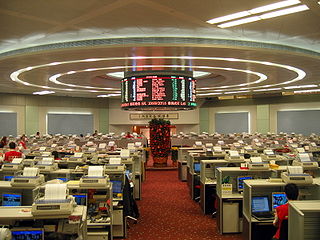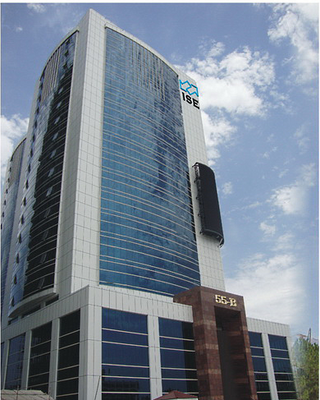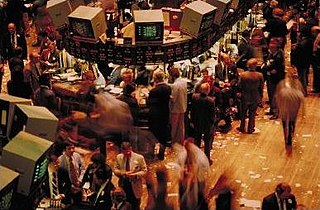Related Research Articles

Automation describes a wide range of technologies that reduce human intervention in processes, namely by predetermining decision criteria, subprocess relationships, and related actions, as well as embodying those predeterminations in machines. Automation has been achieved by various means including mechanical, hydraulic, pneumatic, electrical, electronic devices, and computers, usually in combination. Complicated systems, such as modern factories, airplanes, and ships typically use combinations of all of these techniques. The benefit of automation includes labor savings, reducing waste, savings in electricity costs, savings in material costs, and improvements to quality, accuracy, and precision.

The Stock Exchange of Hong Kong is a stock exchange based in Hong Kong. As of the end of 2020, it has 2,538 listed companies with a combined market capitalization of HK$47 trillion. It is reported as the fastest growing stock exchange in Asia.
An electronic communication network (ECN) is a type of computerized forum or network that facilitates the trading of financial products outside traditional stock exchanges. An ECN is generally an electronic system that widely disseminates orders entered by market makers to third parties and permits the orders to be executed against in whole or in part. The primary products that are traded on ECNs are stocks and currencies. ECNs are generally passive computer-driven networks that internally match limit orders and charge a very small per share transaction fee.

The Islamabad Stock Exchange was a stock exchange located in Islamabad, Capital Territory, Pakistan. In 2016, it merged with the Pakistan Stock Exchange.

The Colombo Stock Exchange (CSE) is the main stock exchange in Sri Lanka that utilizes an electronic trading platform. The CSE headquarters have been located at the World Trade Center (Colombo) Towers in Colombo since 1995, and it has regional branches in Kandy, Jaffna, Negombo, Matara, Kurunegala, Anuradhapura and Ratnapura. The CSE trades 296 companies representing 20 business sectors, as of 25 January 2021, with a combined market capitalization of 3,699 billion Sri Lankan rupees.
Algorithmic trading is a method of executing orders using automated pre-programmed trading instructions accounting for variables such as time, price, and volume. This type of trading attempts to leverage the speed and computational resources of computers relative to human traders. In the twenty-first century, algorithmic trading has been gaining traction with both retail and institutional traders. It is widely used by investment banks, pension funds, mutual funds, and hedge funds that may need to spread out the execution of a larger order or perform trades too fast for human traders to react to. A study in 2019 showed that around 92% of trading in the Forex market was performed by trading algorithms rather than humans.

Open outcry is a method of communication between professionals on a stock exchange or futures exchange, typically on a trading floor. It involves shouting and the use of hand signals to transfer information primarily about buy and sell orders. The part of the trading floor where this takes place is called a pit.

A trading room gathers traders operating on financial markets. The trading room is also often called the front office. The terms "dealing room" and "trading floor" are also used, the latter being inspired from that of an open outcry stock exchange. As open outcry is gradually replaced by electronic trading, the trading room becomes the only remaining place that is emblematic of the financial market. It is also the likeliest place within the financial institution where the most recent technologies are implemented before being disseminated in its other businesses.
Cotation Assistée en Continu (CAC) was an electronic trading system used at the Paris Bourse, the French stock exchange, in the 1980s and 1990s. It was introduced in 1986 for trading less liquid equities, and in 1989 it was operational for all listed stocks. The acronym is also used to refer to the CAC 40, a stock index provided by the Paris Bourse. Curiously, the acronym also fits the name of the early Parisian stockbrokers' association, the "Compagnie des Agents de Change". The CAC system was a version of an earlier system developed by the Toronto Stock Exchange in the mid-1970s: CATS. In the early 1990s, the Paris Bourse developed an upgraded technology known as NSC, which served as a technological platform for the Euronext initiative. The Paris Bourse became Euronext Paris in 2000.
Direct market access (DMA) is a term used in financial markets to describe electronic trading facilities that give investors wishing to trade in financial instruments a way to interact with the order book of an exchange. Normally, trading on the order book is restricted to broker-dealers and market making firms that are members of the exchange. Using DMA, investment companies and other private traders use the information technology infrastructure of sell side firms such as investment banks and the market access that those firms possess, but control the way a trading transaction is managed themselves rather than passing the order over to the broker's own in-house traders for execution. Today, DMA is often combined with algorithmic trading giving access to many different trading strategies. Certain forms of DMA, most notably "sponsored access", have raised substantial regulatory concerns because of the possibility of a malfunction by an investor to cause widespread market disruption.
An automated trading system (ATS), a subset of algorithmic trading, uses a computer program to create buy and sell orders and automatically submits the orders to a market center or exchange. The computer program will automatically generate orders based on predefined set of rules using a trading strategy which is based on technical analysis, advanced statistical and mathematical computations or input from other electronic sources.
The Consolidated Tape Association (CTA) oversees the dissemination of real-time trade and quote information in New York Stock Exchange (NYSE) and American Stock Exchange (AMEX) listed securities. It is currently chaired by Emily Kasparov of the Chicago Stock Exchange, the first woman and the youngest chair elected to the position.

In finance, an electronic trading platform also known as an online trading platform, is a computer software program that can be used to place orders for financial products over a network with a financial intermediary. Various financial products can be traded by the trading platform, over a communication network with a financial intermediary or directly between the participants or members of the trading platform. This includes products such as stocks, bonds, currencies, commodities, derivatives and others, with a financial intermediary, such as brokers, market makers, Investment banks or stock exchanges. Such platforms allow electronic trading to be carried out by users from any location and are in contrast to traditional floor trading using open outcry and telephone based trading. Sometimes the term trading platform is also used in reference to the trading software alone.
High-frequency trading (HFT) is a type of algorithmic financial trading characterized by high speeds, high turnover rates, and high order-to-trade ratios that leverages high-frequency financial data and electronic trading tools. While there is no single definition of HFT, among its key attributes are highly sophisticated algorithms, co-location, and very short-term investment horizons. HFT can be viewed as a primary form of algorithmic trading in finance. Specifically, it is the use of sophisticated technological tools and computer algorithms to rapidly trade securities. HFT uses proprietary trading strategies carried out by computers to move in and out of positions in seconds or fractions of a second.

MetaTrader 4, also known as MT4, is an electronic trading platform widely used by online retail foreign exchange speculative traders. It was developed by MetaQuotes Software and released in 2005. The software is licensed to foreign exchange brokers who provide the software to their clients. The software consists of both a client and server component. The server component is run by the broker and the client software is provided to the broker’s customers, who use it to see live streaming prices and charts, to place orders, and to manage their accounts.
Hull Trading Company was an independent algorithmic trading firm and electronic market maker. Known for its quantitative and technology-based trading strategy, it was acquired by Goldman Sachs in 1999.
BOX Options Exchange, LLC (BOX) is an automated exchange operated by the TMX Group and owned by TMX and a consortium of broker-dealers. As an equity options market, it provides electronic order matching services to stockbrokers and traders.

An order matching system or simply matching system is an electronic system that matches buy and sell orders for a stock market, commodity market or other financial exchange. The order matching system is the core of all electronic exchanges and are used to execute orders from participants in the exchange.
Smart order routing (SOR) is an automated process of handling orders, aimed at taking the best available opportunity throughout a range of different trading venues.

Interactive Brokers LLC (IB) is an American multinational brokerage firm. It operates the largest electronic trading platform in the U.S. by number of daily average revenue trades. The company brokers stocks, options, futures, EFPs, futures options, forex, bonds, funds, and some cryptocurrencies.
References
- Domowitz, I. 1990 "The Mechanics of Automated Trade Execution Systems", Journal of Financial Intermediation 1(2): 167-194.
- Domowitz, I. and Wang, J. 1994 "Auctions as Algorithms: Computerized Trade Execution and Price Discovery", Journal of Economic Dynamics and Control 18(1): 29-60.
- Toronto Stock Exchange, 1982 CATS The First Five Years